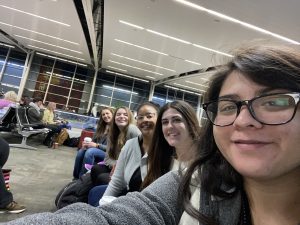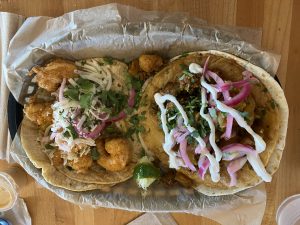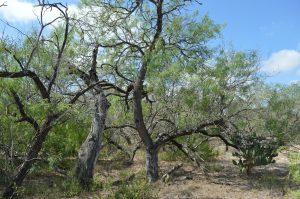Our day is coming to an end, and looking back it doesn’t seem real that we accomplished all that we did today! To be honest, I am already feeling tired and cannot fathom what the upcoming days in the actual field will feel like. My tiredness comes from a combination of a lack of sleep from the night before due to nervousness and also in part due to our day starting before the break of dawn. Our first flight was to Dallas, Texas and I really enjoyed that two hour flight because Alba and I took advantage of American Airlines’ free movie downloads. The selection involved a corny “scary” movie, which we committed to watching until the end knowing it was bad. We had a short layover and our next flight was to San Antonio, Texas. This hour flight involved a nap for a majority of the Beyond Borders team, Sudoku, and reading. Once we landed, we grabbed our luggage, our rental car and to everyone’s surprise, everything ran smoothly.
Before our two and half hour drive to Falfurrias, we made a lunch stop at Torchy’s Tacos. I am still not over how good the sauces that accompany the tacos were. As we made the drive to our final destination, I just kept looking out the window and got a sense as to what kind of terrain we will be working in throughout the next few days. Really thick brush, tall grasses, and a lot of cacti, oh my! During the drive, I also learned that other team members WILL take that unflattering picture of you napping in the car. Once we arrived and got settled into our hotel, we drove to H.E.B., a grocery store which stands for “Here, Everything is Better” and they really live up to their name. The prices are great and they have comfort foods such as tres leches cake and bunuelos. We grabbed essentials like bug spray, shampoo, ibuprofen, and most importantly, snacks! After this errand, we ate at Whataburger, another Texan staple, and had a brief meeting about our game plan for tomorrow. Our team leader, Dr. Latham, passed out our wrist compasses and safety whistles and that is when things started to feel more real for me. Everything we have packed and prepared for will be put to the test tomorrow! As for now, I am looking forward to getting a good night’s rest because we have to wake up bright and early, and I know it is going to be a long and rewarding day working on repairing and replenishing water stations with the South Texas Human Rights Center.


